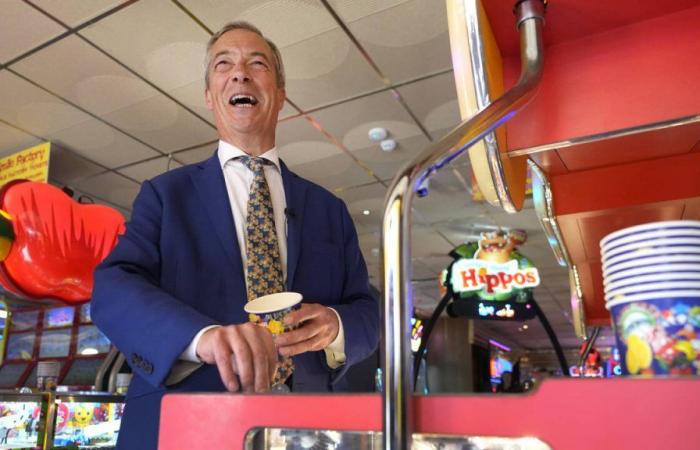On the verge of a big housecleaning
Eight years ago, on June 23, 2016, the British voted for an ill-defined populist project. On July 4, they are preparing to turn the page on this experiment. Not that they are about to return to the EU, no political party is talking about it. But, politically, the country is on the verge of a major housecleaning. The legislative elections announce a large victory for Labor, after fourteen years of opposition. The Conservatives, who are 20 points behind in the polls, could suffer the worst defeat in their history, according to some projections.
Opposite, Labor presents an uncharismatic leader, a soporific speaker, who refuses big promises and avoids the game of political soundbites. In the four years since he took over, Keir Starmer, a former lawyer who entered politics at the age of over 50, has done everything to refocus his party. And he utters sentences like this: “This country lacks a degree of applied seriousness.” In a surprising coincidence of calendars, the election takes place at the same time as the legislative elections in France. While populist temptation is also gaining ground there, British disillusionment offers a series of fascinating lessons.
“There is nothing exceptional about the United Kingdom being attracted to populism, we see it almost everywhere in Europe or the United States,” underlines Tony Blair, the former British Prime Minister. Normally, these movements eventually go away. But the problem for us is that we tested populism not with a person, but with an idea. And now that we have left the European Union, that the decision has been implemented, it is very hard to come back from it.”
‘There was no plan’
The first and most obvious lesson is that the British did not clearly know what they were voting for on June 23, 2016. To leave the EU, certainly, but to do what? Boris Johnson never defined what he intended to do with this “control” taken back from the EU. “There was no plan,” recalls Dominic Grieve, a former Conservative minister, excluded from the party for his opposition to Brexit. It was populism in its purest form: a slogan empty of content.
In this context, voters put in what they wanted. The abandoned people of the north of England believed they heard a promise of better protection. Well-off rural retirees have detected a nostalgia for a return to the country’s past glory. Liberal yuppies cling to a dream of great deregulation. And more than anything, a large part of the population voted for a rejection of immigration. Eight years later, the contradictions of these different aspirations largely explain the mistakes of successive governments.
The second lesson of Brexit is that the “appeasement” policy of the far right or populists never works. In the beginning there was a troublemaker who provoked mockery: Nigel Farage, leader of UKIP (United Kingdom Independence Party). At the beginning of the 2000s, he made significant scores in each European election, before disappearing from the political landscape for five years.
The wave of immigration from Central Europe after the enlargement of the EU from 2004 – more than a million Poles arrived in a few years – provided him with a new powerful argument. He began to eat away at votes on the right. It was to silence this dissent that David Cameron ended up promising a referendum on leaving the EU.
This vote could not be lost, the polls categorically predicted it. The employers, the City, the unions, all the political parties were against Brexit. This was without taking into account the wind of revolt that was blowing across the country, weakened by six years of austerity.
The surprise Brexit victory was not enough, however. The ideologues, in search of identity purity, have systematically rejected all compromises. Theresa May, who campaigned against leaving the EU, was the first to replace David Cameron in Downing Street. Three times, her own deputies rejected the agreement she had concluded with the European negotiator, Michel Barnier. In July 2019, Boris Johnson took over. He opted for the hardest Brexit, with a total break in trade relations. But the revolution always devours its children: the disheveled blond never had the confidence of his own deputies, who had put him in this position to get them out of the rut. Two and a half years after coming to power, and despite a triumph in the December 2019 parliamentary elections, he was forced to resign for lying to parliament about parties held in Downing Street during confinement.
Refusing any compromise with reality, conservative activists then chose Liz Truss to replace him. While inflation was soaring, she presented at the worst time the largest program of tax cuts since Margaret Thatcher. The reaction of the financial markets was panic. Interest rates have soared. The tabloids had fun comparing the new prime minister to a piece of lettuce, to see which of the two would last longer.
A seat for Nigel Farage?
Since then, Rishi Sunak, the current Prime Minister, has vaguely tried to reestablish a semblance of seriousness. But he also pushes the debate against illegal immigration, proposing to send asylum seekers who cross the Channel in inflatable boats to Rwanda. This policy was ruled illegal by the British Supreme Court, as Rwanda was not considered a “safe country” for refugees. No matter: parliament passed a law stipulating that Rwanda was “safe”, regardless of the reality on the ground.
As for Nigel Farage, who should have been completely discredited by the patent failure of Brexit, he is back in the election campaign. This time, his hobby horse is the fight against illegal immigration. He still speaks as well, proposes so-called “common sense” solutions and continues to steer the debate ever further to the right. Polls predict he is expected to win an MP seat for the first time.
The third big lesson is that the concrete damage of a populist project is difficult to erase. On January 1, 2021, the United Kingdom left the European single market. The economic consequences of this full-scale experiment are now known. Trading with the EU is more difficult, requiring extensive paperwork. Given that the Twenty-Seven represent – by far – its first partner, the crumbling of exchanges was inevitable. According to calculations, British growth has been reduced by 3 to 5% compared to what it would have been without Brexit. Spread over eight years, such a result looks more like a slow crumbling than a real collapse. As Michel Barnier, the former EU negotiator, often repeats: “The UK’s problems are not all due to Brexit, but Brexit has made them worse.”







